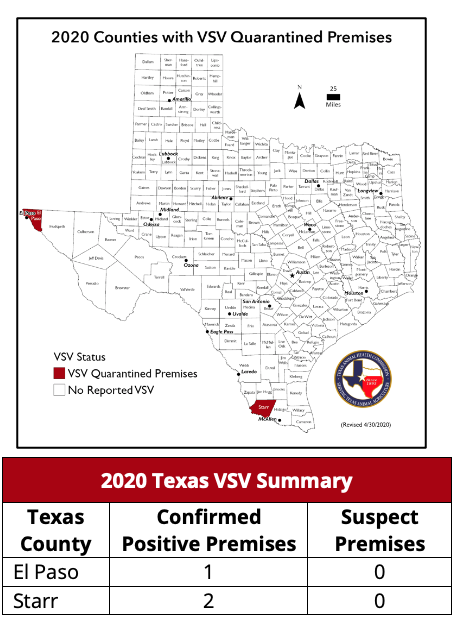Source: Texas Animal Health Commission | April 30, 2020
Vesicular stomatitis virus (VSV) has been confirmed in a horse in El Paso County. This confirmation marks the third case of VSV in Texas this year.
The horse was tested after the owner observed lesions and contacted their veterinary practitioner. The horse has been isolated on the premises and is being monitored. The site will remain under state quarantine until 14 days from the onset of lesions in the last affected animal on the premises.
“VSV is spread by direct contact with infected animals or spread by insect vectors like black flies, sand flies, and biting midges,” said Dr. Andy Schwartz, TAHC executive director. “An epidemiological investigation is underway on the VSV-positive premises to identify the means for disease transmission.”

It is important to note, the National Veterinary Services Laboratories (NVSL) confirmed the VSV virus as the Indiana serotype. This is a different strain from the Starr County confirmation; however, it is the same strain of VSV that has been confirmed in horses in nearby Las Cruces, New Mexico.
Since the VSV infected horse has not recently traveled, this could indicate that infected insects are the likely source of transmission.
Vesicular stomatitis is a viral disease that primarily affects horses and cattle and occasionally swine, sheep, goats, llamas, and alpacas. VSV can cause blisters and sores in the mouth and on the tongue, muzzle, teats or hooves of susceptible animals.
Additional signs of infection include fever, drooling or frothing at the mouth, reluctance to eat, lameness or laminitis if lesions develop around the coronary band. Lesions usually will heal in two or three weeks, and most animals recover with supportive care by a veterinarian
Prevention
Even with the best defensive measures, VSV could infect a herd. However, these tips may help protect livestock:
- Control biting flies by using fly spray, fly traps and maintaining clean pens.
- Keep equine animals stalled or under a roof to reduce exposure to flies.
- Feed and water stock from their individual buckets.
- Don’t visit a ranch that’s under quarantine for VSV. Wait until the animals have healed.
- Restrict nose-to-nose contact between horses from other premises.
- Clean and disinfect tack and equipment between uses.
If You Suspect Infection
- Call your private veterinarian immediately.
- Separate affected horse(s) from all healthy horses on the property.
- Handle all healthy animals before sick animals.
- After handling sick animals make sure to wash and disinfect your hands and boots, if possible, change and wash your clothes as well.
Some states and other countries may restrict movement of, or impose additional requirements for equine or other susceptible animals coming from states having known cases of VSV. Before moving livestock, contact the state of destination for their requirements. For international export information, contact the USDA, Veterinary Services Austin office at (301) 851-3300, option 2.
The TAHC will send out updates upon receiving new VSV confirmations. Click here to sign up for the equine email list to receive the VSV updates to your inbox. All cases will be reported to the Equine Disease Communication Center.
For VSV history and past TAHC updates click here. To view the USDA 2020 VSV situation reports click here.
The United States 2020 VSV outbreak began on April 13, 2020, when NVSL confirmed the first VSV-positive premises in New Mexico. Arizona and Texas subsequently broke with VSV cases.
Veterinary Guidance
If you suspect a client’s animal is infected with VSV, contact your TAHC Region Office for procedures, required paperwork, and important sample submission information.
For more information about VSV and preventative measures, visit the links below:
